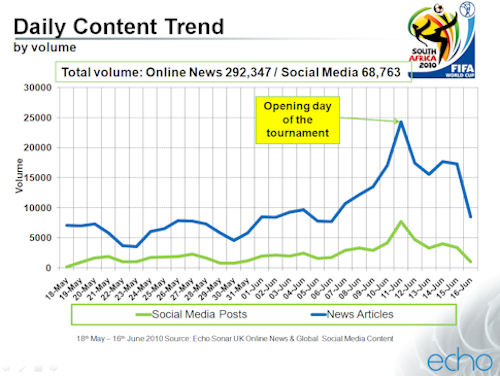There is a deafening buzz surrounding the World Cup, and not all of it is due to the irritating sound of the vuvuzela. Type in “World Cup“ into the search box at bbc.co.uk, and over 70 items come up about the 2010 tournament. These range from latest coverage of the games to features such as “How to throw the perfect World Cup party“ .
According to research commissioned by PRmoment, there have been nearly 300,000 news items in the last month concerning the World Cup, with interest peaking on the opening day of the tournament. This is echoed by hefty social media interest, with nearly 70,000 mentions. All this online chatter is simply a reflection of this society’s obsession with football. And this means that the PR industry is bound to be affected, with many PROs more interested in England’s performance than their own.

Research by Echo Sonar
So how should you handle World Cup fever in your business? London law firm Harbottle & Lewis has produced a guide describing key employment issues arising from the World Cup. Howard Hymanson, partner at the law firm says: "Many employers will be relieved that the World Cup only comes around every four years. It can undoubtedly be a minefield for employers wanting to strike a balance between a happy workforce and a profitable business.
"The most important thing for employers to remember is to deal with all issues fairly and consistently and not to let football fever take over. Not all employees will be football mad and they should not be forgotten whilst pandering to the football-loving crowd."
One problem is dealing with people wanting to take time off to watch matches. Plus there is the risk that some people may call in sick either on the day of a big match itself or to recover the morning after the night before, or worse, not show up to work at all without any explanation. No employer would be surprised to know that the number of unauthorised absences tends to increase during major sporting tournaments.
But you should be wary of accusing a member of staff of pretending to be sick without thinking about the possible consequences. The best idea is to keep records of unauthorised absences and note any patterns that emerge (such as repeated absences coinciding with key matches). The guide suggests that you avoid jumping to conclusions and assume that any absence during the World Cup is due to an unfortunate case of “World Cupitis”.
Of course, many people can watch games online now, which could also affect your business’s productivity. So make sure that everyone knows what you find acceptable. Perhaps the best advice is to take it easy, after all the World Cup only happens once every four years, and it offers you the chance to organise team-bonding events for those that like football. Just don’t forget to consider the feelings of those who can’t stand the game.
Agency Blue Rocket PR is one company that is trying to make the most of the World Cup, despite being a female-dominated office that has little interest in football. Jasmin Robertson, senior account executive, says this is one way to cope as the media goes World Cup mad. Like many other offices, the agency has organised a sweepstake. Robertson says: “We've picked names from a hat and whoever has the winning team will go home with £50 on 12 July. As the weeks pass, I'm sure the prospect of winning the pot will keep us keen.” But then, Roberston is quite hopeful, as her team is Brazil ….
Methodology
PRmoment asked Echo Sonar to analyse online media coverage of the World Cup comparing online news with social media coverage. The research period was 18 May to 16 June 2010.
PR Masterclass: The Intersection of PR and GEO
Wednesday 25th February, both virtual and in person tickets are available.
PR MasterclassIf you enjoyed this article, sign up for free to our twice weekly editorial alert.
We have six email alerts in total - covering ESG, internal comms, PR jobs and events. Enter your email address below to find out more:








